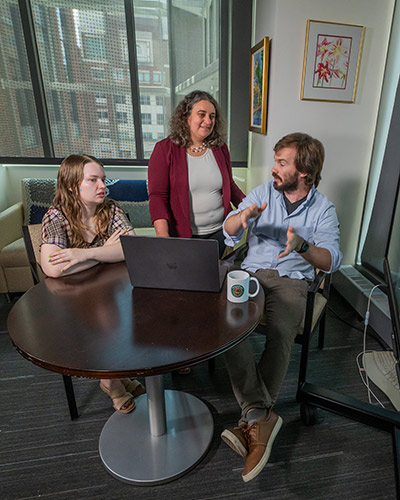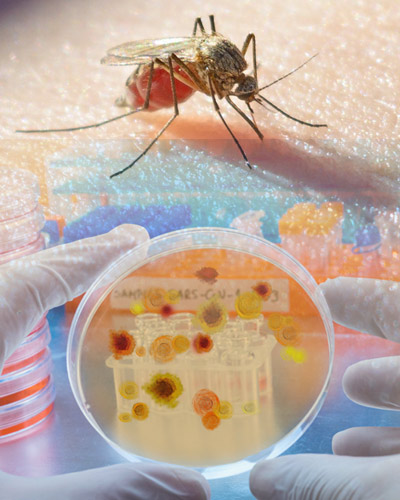November 06, 2024 | Heide Aungst
University of Maryland School of Medicine Researchers Create Large Database of Latin American Populations to Tackle Health Disparities
It is commonly known that most genomic databases are biased toward people with European ancestry. Scientists have warned that leaving out other populations could skew results in areas such as drug development, diagnostic testing, and polygenic risk scores—which looks at many genetic variations in a person’s DNA to predict their disease risk.
 Now, researchers at the Institute for Genome Sciences (IGS) at the University of Maryland School of Medicine (UMSOM) have developed a broad and deep genomic database of Latin Americans which gathers genome-wide data of Latin American populations into a single source and allows other scientists to easily add that population to their own research studies without straining budgets. Cell Genomics published their work on Oct. 31.
Now, researchers at the Institute for Genome Sciences (IGS) at the University of Maryland School of Medicine (UMSOM) have developed a broad and deep genomic database of Latin Americans which gathers genome-wide data of Latin American populations into a single source and allows other scientists to easily add that population to their own research studies without straining budgets. Cell Genomics published their work on Oct. 31.
The researchers define Latin Americans as those with heritage from Spanish or Portuguese speaking countries in the Americas. In the United States, Latin Americans make up 18% of the population and is the fastest growing group but remains understudied in biomedical research, leading to health disparities in the population. Worldwide the Latin American population is 656 million or about 8.5% of the world’s population.
The Genetics of Latin American Diversity Database (GLADdb) includes genome-wide information from almost 54,000 Latin Americans representing 46 geographical regions. The new resource explores patterns of Latin American population structure and allows other scientists to match genes to their external samples through GLAD-match, a new web tool the researchers developed. GLAD-match provides a strong foundation for the human genetics community as it moves from categorizing people broadly to viewing ancestry as a continuum.
“Treating Latin Americans as one homogenous group over-simplifies their genetic diversity and hinders efforts to improve population health and clinical treatment for many diseases,” said Timothy O’Connor, PhD, the lead author of the paper, scientist at IGS, and Associate Professor of Medicine at UMSOM. “By promoting genomic research in Latin Americans, we are contributing to the promise of precision medicine for more people.”
 The team built GLADdb and GLAD-match by pulling Latin Americans’ data from whole genome sequencing projects across the Americas, as well as from dbGaP—the database of Genotypes and Phenotypes—developed by the National Human Genome Research Institute (NHGRI) to archive and distribute data and results from genotype-phenotype studies in humans. Most genomic studies funded by NHGRI are required to submit their data to dbGaP upon publication of the results.
The team built GLADdb and GLAD-match by pulling Latin Americans’ data from whole genome sequencing projects across the Americas, as well as from dbGaP—the database of Genotypes and Phenotypes—developed by the National Human Genome Research Institute (NHGRI) to archive and distribute data and results from genotype-phenotype studies in humans. Most genomic studies funded by NHGRI are required to submit their data to dbGaP upon publication of the results.
“Since we define ‘heritage’ as including culture, geography, and genetics, one of the most interesting parts of this research is that we were able to explore the distant genetic relatedness among Latin American countries through population structure and migration patterns,” said Victor Borda, PhD, corresponding author on the paper and an IGS Research Associate. “For example, in the early 1900s social and economic problems caused a large migration out of Puerto Rico. We found that those who migrated to Hawaii were recognized as countryside people who traditionally farmed, while those who left Puerto Rico for New York represented a cross-section of economic and social classes.”
Since Latin Americans represent only about 0.38% of participants in genome-wide association studies (GWAS), the researchers say that GLADdb should contribute significantly to the understanding of Latin American population genetics and genetic epidemiology when comparing external samples to those within the database.
“Our lack of knowledge of Latin American genetic diversity and environmental factors influencing the health has limited medicine’s understanding of complex traits in this population,” Dr. O’Connor added. “Our hope is that other scientists use GLADdb and GLAD-match in their research to help deepen our understanding and lessen disparities in the Latin American population during the evolving age of precision medicine.”
About the Institute for Genome Sciences
The Institute for Genome Sciences' (IGS) has been part of the University of Maryland School of Medicine (UMSOM) since 2007. IGS scientists work in diverse areas, applying genomics and systems biology approaches to better understand health issues in premature infants, women, and transgender people; to improve vaccine development; to study evolutionary biology; and to understand cancer, parasitic, fungal, and infectious diseases, as well as identifying the underpinnings of aging, brain development, addiction, and mental health. IGS also remains at the forefront of high-throughput genomic technologies and bioinformatics analyses through its core facility, Maryland Genomics which provides researchers around the world with cutting-edge, collaborative, and cost-effective sequencing and analysis.
About the University of Maryland School of Medicine
Now in its third century, the University of Maryland School of Medicine was chartered in 1807 as the first public medical school in the United States. It continues today as one of the fastest growing, top-tier biomedical research enterprises in the world -- with 46 academic departments, centers, institutes, and programs, and a faculty of more than 3,000 physicians, scientists, and allied health professionals, including members of the National Academy of Medicine and the National Academy of Sciences, and a distinguished two-time winner of the Albert E. Lasker Award in Medical Research. With an operating budget of more than $1.2 billion, the School of Medicine works closely in partnership with the University of Maryland Medical Center and Medical System to provide research-intensive, academic, and clinically based care for nearly 2 million patients each year. The School of Medicine has more than $500 million in extramural funding, with most of its academic departments highly ranked among all medical schools in the nation in research funding. As one of the seven professional schools that make up the University of Maryland, Baltimore campus, the School of Medicine has a total population of nearly 9,000 faculty and staff, including 2,500 students, trainees, residents, and fellows. The School of Medicine, which ranks as the 8th highest among public medical schools in research productivity (according to the Association of American Medical Colleges profile) is an innovator in translational medicine, with 606 active patents and 52 start-up companies. In the latest U.S. News & World Report ranking of the Best Medical Schools, published in 2023, the UM School of Medicine is ranked #10 among the 92 public medical schools in the U.S., and in the top 16 percent (#32) of all 192 public and private U.S. medical schools. The School of Medicine works locally, nationally, and globally, with research and treatment facilities in 36 countries around the world. Visit medschool.umaryland.edu
Contact
Heide Aungst
HAungst@som.umaryland.edu
(216) 970-5773 (cell)
Related stories

Friday, July 25, 2025
New Research Simulates Cancer Cell Behavior
In the same vein as weather forecast models that predict developing storms, researchers now have developed a method to predict the cell activity in tissues over time. The new software combines genomics technologies with computational modeling to predict cell changes in behavior, such as communication between cells that could cause cancer cells to flourish.

Wednesday, August 28, 2024
Leading Computational Scientist and Oncology Researcher Elana Fertig, PhD, Appointed as New Director of the Institute for Genome Sciences at the University of Maryland School of Medicine
University of Maryland School of Medicine (UMSOM) Dean Mark T. Gladwin, MD, announced today the appointment of Elana J. Fertig, PhD, FAIMBE, as the new Director of the School’s Institute for Genome Sciences (IGS). She is an internationally-recognized researcher known for her work in integrating spatial multi-omics technologies with mathematical models to develop a new predictive medicine paradigm in cancer. Spatial technologies allow researchers to learn about any cell type inside of natural tissue, including gene activity and cell interactions.

Wednesday, August 24, 2022
UM School of Medicine Study Finds a New Way to Optimize Treatment Success for Fecal Transplants
Fecal transplants have been successful in treating serious diarrheal infections but have often failed when tried with other diseases. Up until now, no one could predict why these treatments sometimes failed to help restore healthy bacteria in the colon. Researchers from the University of Maryland School of Medicine’s (UMSOM) Institute for Genome Sciences (IGS) have discovered important clues that could lead more personalized approaches to optimize treatment success. They published their findings in Cell Reports Medicine online earlier this month.

Monday, July 18, 2022
New Genomic Research Shows Why Testing Malaria Vaccines in the Clinic is as Rigorous as Natural Exposure in the Field
Malaria is the deadliest mosquito-borne parasitic infection of humans. In 2021, after a century of research, the World Health Organization (WHO) approved the world’s first malaria vaccine. That vaccine reduces the incidence of malaria infections in young children aged 5-17 months by only 30 percent, meaning that it remains critical to continue developing and testing more effective vaccines.

Thursday, March 18, 2021
UM School of Medicine Helps Maryland Conduct State-Wide Sequencing of Variants in Positive COVID-19 Test Specimens
In an effort to monitor the spread of COVID-19 variants in the State of Maryland, University of Maryland School of Medicine (UMSOM) Dean E. Albert Reece, MD, PhD, MBA, announced that UMaryland Genomics at UMSOM will perform genome sequencing of variants in at least 10 percent of COVID-19 test samples, reaching an important benchmark set by the federal government to help control the spread of these variants.

Thursday, February 25, 2021
UM School of Medicine Researchers Participate in Landmark Study Detailing Sequencing of Full Human Genomes to Better Capture Genetic Diversity
Researchers at the University of Maryland School of Medicine (UMSOM) co-authored a study, published today in the journal Science, that details the sequencing of 64 full human genomes. This reference data includes individuals from around the world and better captures the genetic diversity of the human species. Among other applications, the work will enable population-specific studies on genetic predispositions to human diseases as well as the discovery of more complex forms of genetic variation.

Wednesday, February 26, 2020
Researchers Develop First Catalogue of Genes that Comprise Community of Microbes in Vaginal Microbiome
University of Maryland School of Medicine’s (UMSOM) Institute for Genome Sciences (IGS) researchers have created the first catalogue of genes that comprise the community of microbes, which inhabit the human vagina. The catalogue, called human vaginal non-redundant gene catalog (VIRGO), was recently released as a public resource that can be used by researchers to facilitate a more in-depth understanding of the role of vaginal microorganisms in women’s health and to potentially develop future treatments for certain gynecologic conditions.

Tuesday, December 03, 2019
UM School of Medicine Researchers Institute for Genome Sciences' Researchers Discover Potential New Treatment for Tropical Parasitic Disease Using Genomics
Using innovative RNA sequencing techniques, researchers at the University of Maryland School of Medicine (UMSOM) Institute for Genome Sciences identified a promising novel treatment for lymphatic filariasis, a disabling parasitic disease that is difficult to treat. The potential new therapy is an experimental cancer drug called JQ1 and targets proteins found prominently in the worm’s genome; it appears to effectively kill the adult worms in a laboratory setting, according to the study which was published today in the journal mSystems.

Tuesday, June 27, 2017
University of Maryland School of Medicine Names David Marcozzi to Help Lead Health Disparities and Population Health Program
Jay S. Magaziner, PhD, MS, Hyg, professor and chair of the Department of Epidemiology and Public Health (EPH) at the University of Maryland School of Medicine (UM SOM), along with UM SOM Dean E. Albert Reece, MD, PhD, MBA, announced today that David Marcozzi, MD, MHS-CL, FACEP, an associate professor in the UM SOM Department of Emergency Medicine, has been named as Co-Director of the UM SOM Program in Health Disparities and Population Health, which is based in EPH.

Wednesday, May 25, 2016
UMSOM Researchers Develop New Way to Decode Large Amounts of Biological Data
A University of Maryland School of Medicine researcher has helped develop an innovative computing technique that, on very large amounts of data, is both faster and more accurate than current methods. To spur research, a program using this technique is being offered for free to the biomedical research community.

